副词构成法
副词的用法

副词的用法一、副词及其基本用法副词主要用来修饰动词,形容词,副词或其他结构。
副词的句法功能1、用作状语Look at the photo carefully. 仔细看看这张照片。
You’re driving too fast. 你开车开得太快了。
2、用作表语The meeting is over. 会议结束了。
Is anyone upstairs? 楼上有人吗?Is the radio on or off? 收音机是开着的还是关着的?【注】在通常情况下,用作表语时不用副词而用形容词。
如可说The woman is beautiful. 而不说The woman is beautifully.可说The cloth feels soft. 不能说The cloth feels softly.英语中用作表语的副词主要是表地点的副词以及某些与介词同形的副词,而且只能用于连系动词be 英语中用作表语的副词主要是表地点的副词以及某些与介词同形的副词,而且只能用于连系动词后作表语,而不用于其他连系动词后作表语,如可说He is here 或He is abroad,但不能说He seems here 或He seems abroad。
3、用作宾语It’s hot in here. 这里面很热。
It’s not far from here. 从这儿去不远。
I’ll stay at home tonight. 今晚我将呆在家里。
【注】副词用作宾语的用法十分有限,通常只用作介词宾语,并且只限于某些表示时间和地点的副词,而且不同的副词有不同的搭配特点,如here和there 可与along, around, down, from, in, near, round, up 等介词连用,但通常不与介词to连用,如不说come to here, go to there 等(注:from here to there是例外),而表地点的副词abroad 则只与介词from连用,不与其他介词连用。
中考英语名词、冠词、介词、形容词、副词、数词、代词使用方法及练习题
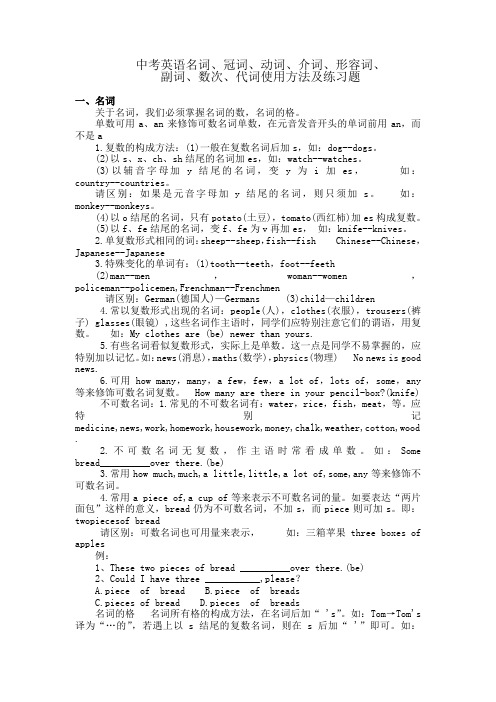
中考英语名词、冠词、动词、介词、形容词、副词、数次、代词使用方法及练习题一、名词关于名词,我们必须掌握名词的数,名词的格。
单数可用a、an来修饰可数名词单数,在元音发音开头的单词前用an,而不是a1.复数的构成方法:(1)一般在复数名词后加s,如:dog--dogs。
(2)以s、x、ch、sh结尾的名词加es,如:watch--watches。
(3)以辅音字母加y结尾的名词,变y为i加es,如:country--countries。
请区别:如果是元音字母加y结尾的名词,则只须加s。
如:monkey--monkeys。
(4)以o结尾的名词,只有potato(土豆),tomato(西红柿)加es构成复数。
(5)以f、fe结尾的名词,变f、fe为v再加es,如:knife--knives。
2.单复数形式相同的词:sheep--sheep,fish--fish Chinese--Chinese,Japanese--Japanese3.特殊变化的单词有:(1)tooth--teeth,foot--feeth(2)man--men,woman--women,policeman--policemen,Frenchman--Frenchmen请区别:German(德国人)—Germans (3)child—children4.常以复数形式出现的名词:people(人),clothes(衣服),trousers(裤子) glasses(眼镜) ,这些名词作主语时,同学们应特别注意它们的谓语,用复数。
如:My clothes are (be) newer than yours.5.有些名词看似复数形式,实际上是单数。
这一点是同学不易掌握的,应特别加以记忆。
如:news(消息),maths(数学),physics(物理) No news is goodnews.6.可用how many,many,a few,few,a lot of,lots of,some,any等来修饰可数名词复数。
副词的用法

副词副词的构成:1.在形容词后直接+ly,如:careful-carefully;quick-quickly;slow - slowly ; sad - sadly2.辅音字母+y结尾的形容词,把y改为i再+ly,如:happy-happily;angry-angrily3.以le结尾的形容词,去掉e再+y,如:simple-simply;terrible-terribly4. 以e结尾的形容词,直接加-ly;fortunate - fortunately polite- politely5. 有些词既可以做形容词也可以做副词如:late,early,hard,fast,far,high6. good的副词是well7. 注意:hardly(几乎不)与hard的区别;friendly是形容词其的副词是friendlily8. 有些词虽是以- ly 结尾但不是副词而是形容词:friendly 友好的lovely 可爱的likely 可能的lonely 孤独的deadly 致命的weekly 每周的lively 有生气的写出下列形容词相应的副词1. careful2.quiet3.bad4.slow5.true6.terrible7.heavy 8.angry 9.good10.fast te 12.early副词的基本用法:区别:形容词(adj.) 修饰名词或代词。
These are the world’s only invisible fish. 通常放在所修饰的名词前Everything is quiet 通常放在系动词(be,感官动词, 变得…)复合不定代词后感官动词(feel , smell, taste, look, hear\sound )复合不定代词: 由some any, every,no等构成如nothing special副词(adv.) 修饰动词,形容词,副词或整个句子。
His fish tanks sell very quickly. 通常放在所修饰的动词后They are completely satisfied. 通常放在所修饰的形容词,副词前Luckily, he won the competition. 修饰整个句子,放在句首用正确形式填空1.This cake smells _________ and sells _________. (good)2.He works very ________.He __________has a rest on Sundays.(hard)3.We must listen to our teacher _____________.(careful)4.Will you please drive _______? The plan is taking off.(fast)5.The old lady shouted ___________ at the boys who broke her windows.(angry)用所给形容词的原级、比较级或最高级填空1.Peter studies ___________. Jane studies ___________than peter. Tom studies_________.(well)2.Lucy runs as ___________ as Kate.(fast)3.Michael cuts __________ than I .Tim cuts ___________ of the three.(slow)4.She played the piano much __________ than you. I played __________among the five.(wonderful)5.John comes ___________than Jim.Jim comes ____________in his class.(late)6.I speak very __________.Jim speaks __________than I. Lucy speaks ________of all.(loudly)拓展生活是一个五味瓶,包含甜酸苦辣,作为学生的你,一定有很多想法。
英语语法——副词

副词连用顺序:程度副词+方式副词+地点副词+时间副词。
副词 fùcí[adverb] 起修饰或限制动词或形容词作用、表程度或范围的词。
编辑本段分类1) 时间和频度副词:now,then,often,always,usually,early,today, late, next,lastday,already,generally,frequently,seldom,ever,never,yet,soon,too, immediately, finally,shortly, before, ago,sometimes, yesterday. once,twice2) 地点副词:here, there, everywhere, anywhere, in, out, inside, outside, above, below, down, back, forward, home, upstairs, downstairs, across, along, round , around, near, off, past, up, away, on.3) 方式副词:carefully, properly, anxiously, suddenly, normally, fast, well, calmly, politely, proudly, softly, warmly4) 程度副词:much,little, very,rather,so,too,still, quite, perfectly, enough, extremely, entirely,almost, slightly, hardly.5) 疑问副词:how, when, where, why.6) 关系副词:when, where, why.7) 连接副词:therefore,moreover,however,otherwise,then. 编辑本段用法副词在句中可作状语,表语,补语,定语。
形容词比较级与副词比较级的构成方法
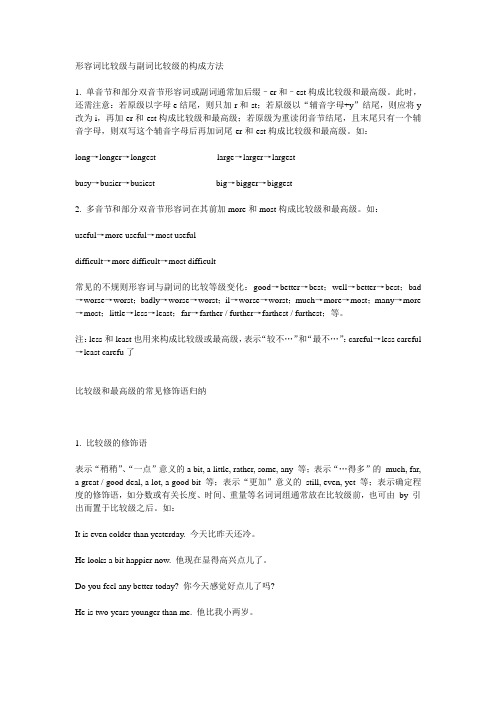
形容词比较级与副词比较级的构成方法1. 单音节和部分双音节形容词或副词通常加后缀–er和–est构成比较级和最高级。
此时,还需注意:若原级以字母e结尾,则只加-r和-st;若原级以“辅音字母+y”结尾,则应将y 改为i,再加-er和-est构成比较级和最高级;若原级为重读闭音节结尾,且末尾只有一个辅音字母,则双写这个辅音字母后再加词尾-er和-est构成比较级和最高级。
如:long→longer→longest large→larger→largestbusy→busier→busiest big→bigger→biggest2. 多音节和部分双音节形容词在其前加more和most构成比较级和最高级。
如:useful→more useful→most usefuldifficult→more difficult→most difficult常见的不规则形容词与副词的比较等级变化:good→better→best;well→better→best;bad →worse→worst;badly→worse→worst;il→worse→worst;much→more→most;many→more →most;little→less→least;far→farther / further→farthest / furthest;等。
注:less和least也用来构成比较级或最高级,表示“较不…”和“最不…”:careful→less careful →least carefu了比较级和最高级的常见修饰语归纳1. 比较级的修饰语表示“稍稍”、“一点”意义的a bit, a little, rather, some, any 等;表示“…得多”的much, far, a great / good deal, a lot, a good bit 等;表示“更加”意义的still, even, yet 等;表示确定程度的修饰语,如分数或有关长度、时间、重量等名词词组通常放在比较级前,也可由by 引出而置于比较级之后。
副词变化规律

副词变化规律
副词是形容词或其他副词的修饰语,在句子中用来修饰其他词语,表示程度、范围、时间、方式等。
根据副词的词性特点和在句中的作用,副词的变化规律可以归纳如下:
1. 双音节以"-ly"结尾的副词
这是英语中最常见的一类副词形式。
例如:
- 形容词: careful
副词: carefully
- 形容词: happy
副词: happily
2. 以"well"结尾的形容词变为副词时,通常无需改变
- 形容词: well
副词: well
3. 一些不规则形式副词
- 形容词: good
副词: well
- 形容词: bad
副词: badly
4. 有些双音节形容词的副词形式要改变发音
- 形容词: polite
副词: politely (重读在第二个音节)
5. 有些副词由相关的名词或动词派生而来
- 名词: luck
副词: luckily
- 动词: migrate
副词: migratorily
6. 一些副词是固定的词语不可分解
- maybe, seldom, ever, never等
大多数副词是由形容词加上"-ly"构成的。
同时也有一些例外和不规则形式需要注意。
了解副词的构词规律有助于更好地理解和运用副词。
形容词、副词比较级和最高级的构成及用法

格式: much+ 副词比较级+than
例句: Can Kim run faster than Jim? Sue goes to the movies much more than I do. Today the water in the river is flowing slower than
yesterday. Today Amy arrived at the school earlier than me.
5.无比较级的形容词
right wrong perfect excellent
有些词本身含有比较含义,也没有比较级:
senior(年长的) junior(年小的) major(主要的) minor(次要的)
提示:避免双重比较
cheaper more cheaper
better more better
Lee is a better student than me.=Lee is a better student than I am. I'm healthier than her.=I'm healthier than she is.
格式: the+形容词最高级
例句: Which girl is the tallest,Liz,Jane or Jill? Mr.Wood is the friendliest person in our neighborhood. Lisa is the fastest swimmer on our swimming team. She is the most hardworking student I've ever known.
单音节的形容词+er/est
副词构词法
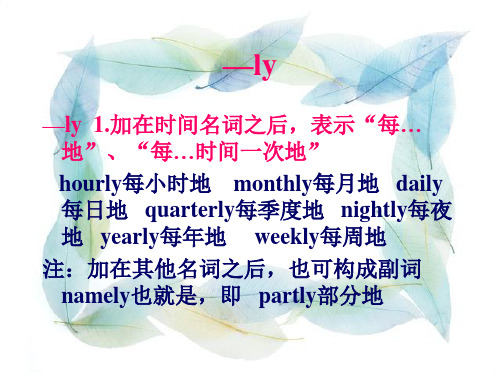
pairwise成双成对地
—ly
—ly 1.加在时间名词之后,表示“每… 地”、“每…时间一次地” hourly每小时地 monthly每月地 daily 每日地 quarterly每季度地 nightly每夜 地 yearly每年地 weekly每周地
注:加在其他名词之后,也可构成副词 namely也就是的兼作形容词后缀 1.常与—ways通用,表示方向,方式,状
态 crosswise交叉地(的) coastwise沿海岸 cornerwise对角地,斜 lengthwise纵长 地 endwise末端朝前地 sidewise斜向一边 地(的)
2.也有不与—ways通用者 clockwise顺时针方向 likewise同样地 sunwise顺日转方向 otherwise要不然, 否则
2.加在形容词之后,构成副词,表示状态、 程度、方式、“…地”
truly真正地,确实地 badly恶劣地 greatly大大地 quickly迅速地 fearfully 可怕地 quietly安静地 newly新近,最 近 gloriously光荣地 carefully仔细地 fortunately 幸运地
—ward
—ward 形容词及副词的后缀 表示“向…的”、“向…”、“朝…”
downward向下(的) sunward向阳(的) upward向上(的) backward向后(的) northward向北(的) outward向外(的) inward向内(的) seaward向海(的) homeward向家(的)
形容词和副词比较级和最高级的构成、用法及标志词

形容词和副词比较级和最高级的构成、用法及标志词我们知道形容词和副词有三个等级:1.原级,即原形。
2.比较级,表示“较……”或“更……一些”,两个事物进行比较。
3.最高级,表示“最……”,三个或三个以上的事物进行比较。
现在我们来看看它们的构成吧!第一,规则变化1. 现在词尾加-er/est.eg:tall-taller-tallestwarm-warmer-warmestquiet-quieter-quietest2. 以字母e结尾的词,在词尾加-r/-st.eg: late-later-latestfine-finer-finestlarge-larger-largestclose-closer-closest3. 以辅音字母加-y结尾的双音节词,先把“y”改为“i”,再加-er/-est.eg: easy-easier-easiestearly-earlier-earliestfunny-funnier-funniestfriendly-friendlier-friendliestbusy-busier-busiest4. 以只有一个辅音字母结尾的重读闭音节词,先双写辅音字母再加-er/-est.eg: big-bigger-biggesthot-hotter-hottestwet-wetter-wettestfat-fatter-fattestthin-thinner-thinnest5. 多音节词,在词尾加-more/-most.eg: beautiful-more beautiful-most beautifulserious-more serious-most seriousoutgoing-more outgoing-most outgoing第二,不规则变化不规则变化就只有这几个词,大家只需牢牢记在心里就好了。
good/well-better-bestbad/badly/ill-worse-worstmany/much-more-mostlittle-less-leastfar-farther/further-farthest/furthest以上是给同学总结的形容词即副词的比较级和最高级的构成,所举的例子也是常用到的单词,希望大家最好把这些单词背下来。
形容词和副词的比较级和最高级用法和构成法
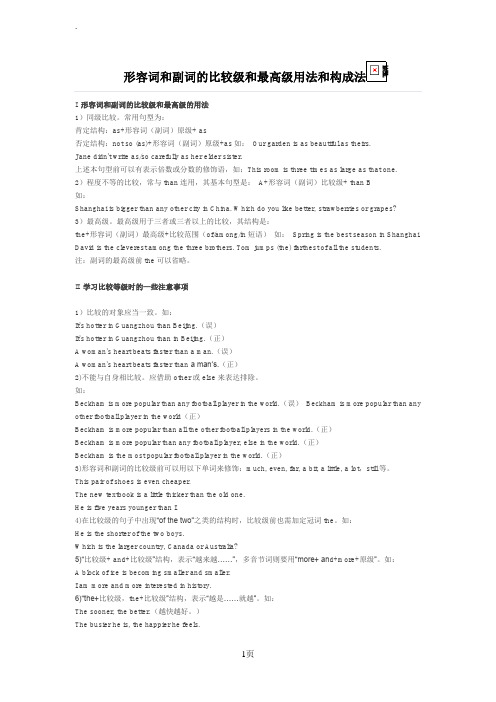
形容词和副词的比较级和最高级用法和构成法I 形容词和副词的比较级和最高级的用法1)同级比较。
常用句型为:肯定结构:as+形容词(副词)原级+ as否定结构:not so (as)+形容词(副词)原级+as如:Our garden is as beautiful as theirs.Jane didn't write as/so carefully as her elder sister.上述本句型前可以有表示倍数或分数的修饰语,如:This room is three times as large as that one.2)程度不等的比较,常与than连用,其基本句型是:A+形容词(副词)比较级+ than B如:Shanghai is bigger than any other city in China. Which do you like better, strawberries or grapes?3)最高级。
最高级用于三者或三者以上的比较,其结构是:the+形容词(副词)最高级+比较范围(of/among/in短语)如:Spring is the best season in Shanghai. David is the cleverest among the three brothers. Tom jumps (the) farthest of all the students.注:副词的最高级前the可以省略。
II 学习比较等级时的—些注意事项1)比较的对象应当一致。
如:It's hotter in Guangzhou than Beijing.(误)It's hotter in Guangzhou than in Beijing.(正)A woman's heart beats faster than a man.(误)A woman's heart beats faster than a man’s.(正)2)不能与自身相比较。
六大英语构词法详解
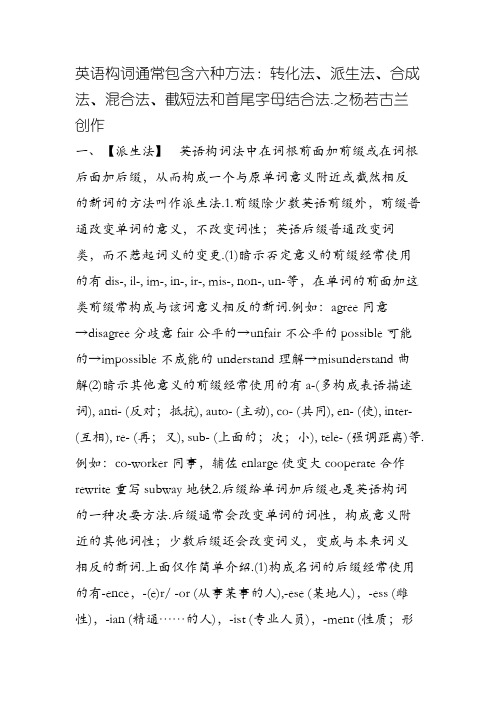
英语构词通常包含六种方法:转化法、派生法、合成法、混合法、截短法和首尾字母结合法.之杨若古兰创作一、【派生法】英语构词法中在词根前面加前缀或在词根后面加后缀,从而构成一个与原单词意义附近或截然相反的新词的方法叫作派生法.1.前缀除少数英语前缀外,前缀普通改变单词的意义,不改变词性;英语后缀普通改变词类,而不惹起词义的变更.(1)暗示否定意义的前缀经常使用的有dis-, il-, im-, in-, ir-, mis-, non-, un-等,在单词的前面加这类前缀常构成与该词意义相反的新词.例如:agree同意→disagree分歧意fair公平的→unfair不公平的possible可能的→impossible不成能的understand理解→misunderstand曲解(2)暗示其他意义的前缀经常使用的有a-(多构成表语描述词), anti- (反对;抵抗), auto- (主动), co- (共同), en- (使), inter- (互相), re- (再;又), sub- (上面的;次;小), tele- (强调距离)等.例如:co-worker 同事,辅佐enlarge 使变大cooperate 合作rewrite 重写subway 地铁2.后缀给单词加后缀也是英语构词的一种次要方法.后缀通常会改变单词的词性,构成意义附近的其他词性;少数后缀还会改变词义,变成与本来词义相反的新词.上面仅作简单介绍.(1)构成名词的后缀经常使用的有-ence,-(e)r/ -or (从事某事的人),-ese (某地人),-ess (雌性),-ian (精通……的人),-ist (专业人员),-ment (性质;形态),-ness (性质;形态),-tion(动作;过程)等.例如:differ 分歧于→diff erence区别write写→writer作家China中国→Chinese中国人act扮演→actress女演员music音乐→musician音乐家(2)构成动词的后缀经常使用的有-(e)n (多用于描述词以后),-fy (使……化),-ize (使……成为).例如:wide→widen加宽beauty→beautify美化pure→purify提纯real→realize认识到organ→organize组织sharp→sharpen使变锋利(3)构成描述词的后缀经常使用的有-al,-able (有能力的),-(a)n(某国人的),-en (多用于暗示材料的名词后),-ern (方向的),-ese(某国人的),-ful,-(ic)al,-ish,-ive,-less (暗示否定),-like (像……的),-ly,-ous,-some,-y (暗示天气)等.例如:nature天然→natural天然的reason道理→reasonable有道理的America美国→American美国的China 中国→Chinese中国人的gold金子→golden金的east东→eastern东方的child孩子→c hildish孩子气的snow雪→snowy雪的(4)构成副词的经常使用后缀有-ly (次要用于描述词以后暗示方式或程度),-ward(s) (次要用于暗示方位的词以后暗示方向).例如:angry生气的→angrily生气地to到→towards朝……,向……east东方→eastward向东(5)构成数词的后缀有-teen (十几),-ty (几十),-th (构成序数词).例如:six六→sixteen十六→sixteenth第十六four四→forty四十→fortieth第四十二、【合成法】英语构词法中把两个单词连在一路合成一个新词,前一个词润色或限制后一个词,如许的方法就是合成法.1.合成名词名词+名词weekend周末名词+动词daybreak黎明名词+动名词handwriting书法名词+及物动词+er/or pain-killer止痛药名词+介词+名词sister-in-law嫂子代词+名词she-wolf母狼动词+名词typewriter打字机动名词+名词reading-room阅览室此刻分词+名词flying-fish飞鱼描述词+名词freshman大一重生副词+动词outlook景色,风光介词+名词afterbrain后脑2.合成描述词名词+描述词bloodred血红的名词+此刻分词French-speaking讲法语的名词+to+名词one-to-one一对一的名词+过去分词man-made人造的数词+名词one-way单行道的数词+名词+描述词three-year-old三岁的数词+名词+ed ten-storeyed十层的动词+副词one-off 一次性的描述词+名词high-quality高质量的描述词+名词+ed noble-minded高尚的描述词+描述词light-green浅绿色的描述词+此刻分词ordinary-looking边幅普通的副词+描述词ever-green常青的副词+此刻分词hard-working辛苦的副词+过去分词well-known闻名的副词+名词fast-food专门提供快餐服务的介词+名词indoor室内的3.合成动词名词+动词sleep-walk梦游描述词+动词white-wash粉刷副词+动词overwhelm压服,礼服4.合成副词描述词+名词hotfoot匆忙地描述词+副词everywhere到处副词+副词however尽管如此介词+名词beforehand事先介词+副词forever永久5.合成代词代词宾格+self herself 她本人物主代词+self myself 我本人描述词+名词anything 一切6.合成介词副词+名词outside在……里面介词+副词within在……以内副词+介词into进入三、【转化法】英语构词法中把一种词性用作另一种词性而词形不变的方法叫作转化法,有的名词可以作动词,有的描述词可以作副词或动词.1.动词转化为名词1)意思没有变更,例如:I think we'd better finish the talk now.我想我们的谈话最好此刻结束.2)意思有必定变更,例如:He is a man of strong build.他是一个体格健壮的汉子.3)构成短语,例如:Let's have a look first. 我们先看一下吧.2.名词转化为动词1)暗示物体的,如:Have you booked the ticket?你订好票了吗?2)暗示身体部位的,如:Hand in your papers please.请把你们的试卷交上来.3)暗示一类人的,如:She nursed her husband back to health.她看护丈夫,使他恢复了健康.4)抽象名词,如:We breakfasted together.我们在一路吃了早饭.3.描述词转化为动词少数描述词可以转化为动词.例如:We will try our best to better our living conditions.我们要尽力改善我们的生活情况.4.副词转化为动词有少数副词可以转化为动词.例如:Murder will out.恶事终势必败露.5.描述词转化为名词1)暗示色彩的描述词常可转化为名词,如:The girl in black appears very beautiful.那个穿黑衣服的女孩子看上去非常漂亮.2)一些描述词如old, young, poor, rich, wounded, injured等与the连用,暗示一类人,作主语时,谓语用复数,如:We don't belong to the rich, but we dong't belong to the poor either. 我们不是有钱人,但我们也不是穷人.四、【截短法(缩略法)】将单词缩写,词义和词性坚持不变的英语构词法称为截短法,次要有截头、去尾、截头去尾等方式.1.截头telephone→phoneairplane→plane2.去尾mathematics→mathsexamination→examkilogram→kilolaboratory →labtaxicab→taxi3.截头去尾influenza→flurefrigerator→fridgeprescription→script五、【混合法(混成法)】英语构词还可以将两个词混合或各取一部分紧缩而成一个新词,前半部分表属性,后半部分表主体.如许的英语构词法就是混合法.newsbroadcast→newscast旧事广播television broadcast→telecast电视广播smoke and fog→smog烟雾photo andgraphy→photography摄影,摄影术helicopter airport→heliport 直升飞机场六、【首尾字母缩略法】用单词首尾字母构成一个新词的英语构词法叫做首尾字母缩略法.这类方式的英语构词生成的新词,读音次要有两种方式,即各字母分别读音;作为一个单词读音.Testing of English as a ForeignLanguage→TOEFL托福Teach English as a Foreign Language→TEFLTeach English as a SecondLanguage→TESLGraduate Record Examination→GRE美国研讨生入学考试1、名词: 可数(1)把握名词复数方式的构成①直接在词尾 + s(boys, pencils)②以ch, sh, s, x结尾的 + es(watches, buses)③以“辅音字母+ y”结尾的, 变y为i + es(families, cities)④以f, fe结尾的, 变f, fe为v + es(knives, leaves)⑤不规则变更(children, women, fish, tomatoes)留意①单复数同形的名词: sheep, Chinese, Japanese.②只要复数方式的词: people, trousers, clothes, thanks.(2)把握名词的所有格的两种暗示法①有生命的人或动物的所有格常在单词后边加's②无生命的事物的所有格用of.my mother's bag the dog's house the door of our classroom留意, 加's构成所有格时, 如果名词本人是以s结尾的则只加', 不加s.(3)不成数名词①不成数名词没有复数方式, 且前边不克不及用不定冠词, 也不克不及用数词作定语.②作主语时, 谓语动词用单数方式.③使用量词短语暗示数量.a piece of news a cup of tea2、冠词(1)把握不定冠词a和an的用法用在第一次提到的可数名词单数前或泛指一类人或物及固定词组中.(2)把握定冠词the的用法①用来特指某人或某物.②用活着界上独一无二的事物的名称前.③用在序数词和描述词第一流前.④用在姓氏的复数方式前, 暗示夫妇或一家人.⑤某些词组中的固定搭配.3、代词(1)分清人称代词的主格和宾格的用法①主格在句子中作主语.②宾格在句子中作宾语.(2)分清描述性物主代词和名词性物主代词的用法①描述词性物主代词后边必须跟着它所润色的名词.②名词性物主代词后边不克不及再跟名词.(3)反身代词的构成和用法反身代词在句中次要起强调感化, 词组有teach oneself, learn by oneself(4)把握以下不定代词的基本用法①some——一些.经常使用于肯定句, 可润色可数名词和不成数名词.any——一些, 任何.经常使用于任何否定句, 疑问句条件句中, 可润色可数名词和不成数名词.留意与some或any组合生成的词(something, somebody, someone, anything, anybody, anyone), 其用法与some和any基底细同.②each——可单独使用, 强调个体, 用于两者或两者以上的每个人或物, 可作名词和描述词使用.every——不成单独使用, 强调全体, 用于三者或以上的情况, 只能作描述词用.③both, all, neither, none, either, any, the other的区别.含义对象都都不任何(一个) 每(一个) 另(一个)two both neither either each the otherthree all none any every another(5)初步把握it用来暗示天然景象、时间、距离及作方式主语或方式宾语的用法.It's 3 o'clock in the afternoon.It's about 5 kilometres away.It's raining now.It's important to learn English well.You'll find it easy to make a kite.4、数词(1)把握基数词和序数词的构成及基本用法.留意以下几个序数词的写法:first, second, third, fifth, eighth, ninth, twelfth, twentieth, thirty-first one hundredth(2)把握千以内数字的写法:8, 231 eight thousand two hundred and thirty-one(3)把握年、月、日的表达法及日常交际用语中数字的表达法:(on) August seventh, 1979; page 58; Unit25; Class Three Grade One; the No.168 Middle School(4)把握以下词组的用法:hundreds of, thousands of, millions of, three hundred students 5、描述词和副词(1)描述词和副词的原级、比较级和第一流的构成及使用.①原级: 没有比较用原级, 特定句型用原级(as…as, not as…as, not so…as).②比较级: 两者比较用比较级, 句中有"A or B"句型或than.③第一流: 三者或三者以上比较用第一流, 句中有"A, B or C"句型或由in或of引出比较范围.④其它表达法: 比较级 + and + 比较级表“愈来愈……”, The + 比较级, the + 比较级表“越……越……”eg: ①Mike is tall.This room is as big as that one.This lesson isn't as interesting as lesson Three.Tom doesn't run so fast as Jack.②Which is b etter, this one or that one?My sister writes more carefully than my brother.③Who is the tallest, Jack, John or Tom?He is the most careful in our class.Changjiang River is the longest river in China.④Spring is coming. It's getting warmer and warmer.The barder he studied, the more knowledge he got.⑤描述词副词比较级和第一流的构成a、直接 + er / + estb、以e结尾的 + er / + estc、以辅音字母 + y结尾的变y为i + er / + estd、重读闭音节以一个辅音字母结尾的, 双写 + er / + este、不规则变更f、多音节和少数双音节的词, 在词前加more或most(2)易混的副词辨析:①already, 多用于肯定句, yet多用于否定句或疑问句中②to o, also, either都暗示“也”too和also都用于肯定句中, too常放在句尾, also常放在句中, either用于否定句的句尾.6、介词(1)暗示时间的介词in, on, atin——用于较长一段时间, 礼拜, 月份, 季节, 年, 朝代世纪或非特指的早、午、晚等.on——具体某一天或具体某一个早、午、晚.at——在某一点时间或某个瞬间.eg: in 1988, in the 21st century, in winter, in March, in the moring, on Saturday evening, on the May seventh, on a windy night, on the afternoon, of October 31st, at eight o'clock, at night, at noon, at the end of, at this moment, at this time, at the age of(2)in与after暗示“当前”时的区别in——暗示以此刻为起点的“当前”, 经常使用于将来时态中.after——经常使用于普通过去时态中, 暗示在过去某个时间以后.eg: We'll come back in two weeks.我们将在两周后回来.They came back after two weeks.两周当前, 他们回来了.(3)ago与before暗示“在……之前”时的区别ago——暗示从此刻算起的“之前”, 经常是“一段时间 + ago”before——暗示以过去为起点的“之前”时, 经常是“一段时间+ before”, 如果是:”“before + 一点时间”, 则只暗示在某一点之前.eg: He went to the library 2 hours ago.He said he had gone to the library 2 hours before.They will start before eight o'clock tomorrow morning.I went to bed before nine yesterday evening.(4)for与duringfor + 一段时间常暗示“持续了一段时间”, 而during则暗示在……期间eg: He has been in Beijing for 3 years.I was in Beijing during last summer.(5)in与at暗示方位时at——与小的地点连用, 有“在某一点”的含义.in——与大的地方连用有“在…范围以内”的含义.He was lost at the station.The twins were born in a big city.(6)over, above与on暗示“在……上”的区别. over——指没有接触面的正上方, 反义词是under. above——指没有接触面的上方, 在高一些的地位, 反义词是below.on——指有接触面的, 在……的概况上.The plane is above the clouds.The bridge is over the river.The cup is on the table.(7)熟练把握介词与动词、名词、描述词搭配构成的词组, 另外还要留意, 介词的后边要跟名词作它的宾语, 如果是动词, 则要变成动名词(doing)的方式.如: She is good at singing.I'm good at English.7、连词(1)把握连词的含义与用法and(和, 并), but(但是), or(否则, 或者), so(所以, 因而),when(当……的时候), either…or(或者……或者, 不是……就是), neither…nor(既不……也不……), so…that(如此……乃至于……)8、动词(1)熟练把握动词的此刻分词, 第三人称单数, 过去式, 和过去分词的构成.留意牢记不规则动词的过去式和过去分词.(2)把握四类动词的普通用法:①实义动词——分为及物和不及物两种, 在句中作谓语.②连系动词——be, look, feel, get, turn, become, keep等, 在句中与表语一路构成相当于谓语部分的系表结构.③助动词——帮忙谓语动词构成分歧的时态和否定句, 疑问句, 不克不及单独使用, 也无含义.④情态动词——可以说是一种特殊的助动词, 情态动词没有人称和数的变更, 后边必须跟动词本相, 而且本人不单有含义而且可以直接构成否定句和疑问句.(3)非谓语动词的习气用法, 必定要熟记1)begin to do sth 2)start to do sth3)decide to do sth 4)want to do sth5)(would) like to do sth 6)forget to do sth7)remember to do sth 8)love to do sth9)learn to do sth 10)need to do sth11)try to do sth 12)try not to do sth13)stop to do sth 14)ask sb.to do sth15)ask sb.not to do sth 16)like sb.to do sth17)teach sb.to do sth 18)tell sb.to do sth19)tell sb.to do sth 20)want sb.to do sth21)help sb.(to) do sth 22)let sb.do sth23)have sb.do sth 24)make sb.do sth25)had better do sth 26)had better not do sth27)feel / hear sb.do sth 28)watch / see sb.do sth29)why not do sth 30)be busy doing sth31)see / watch sb doing sth 32)feel / hear sb doing sth33)enjoy doing sth 34)finish doing sth35)keep (sb) doing sth 36)go on doing sth37)stop doing sth 38)like doing sth39)begin doing sth 40)start doing sth41)prevent sb from doing 42)stop sb / sth from doing sth 43)spend时间 / 金钱(in) doing sth 44)It takes sb. some time todo sth.45)It is good (wrong, easy, difficult, important…) to do sth46)It is time (for sb.) to do sth 47)be used for doing sth 48)will / would you please do sth 49)what about (doing) sth (4)能够区别使用以下动词1)tell, say, speak, talk2)bring, take, carry3)lend, borrow, keep4)listen, listen to, hear, hear from, hear of5)look, look at, see, watch, notice6)reach, arrive(in / at), get to7)look for, look after, look at, look up8)put on, put up, put down, put away, put into9)look for, find, find out, found10)take off, take away, take down11)try on , put on, wear, dress, get dressed12)ask for, send for13)get back, give back, take back14)be made in, be made of, be made from, be made by15)get on, got off, get into, get out of16)get in, get up, get on…with17)go down, go on, go out18)look out, look out of19)turn on, turn off, turn up, turn down, turn to, turn over20)send out, sent to , send away, send up, send for21)fill…with… be full of… be filled with…23)be in, be out, be away, be over, be up24)wear out, sell out25)worry about the worried about26)cost, pay, spend, take(5)留意延续性动词(段动词)与瞬间动词(点动词)在用法上的区别.瞬间动词有: join, buy, come, go, leave, arrive, begin, start, open, closed, become, borrow, lend, die, get等.记住: 瞬间动词(点动词)不克不及与暗示持续一段时间的时间状语连用.。
副词的构成与分类

副词的构成与分类副词是英语中一类重要的词性,它可以修饰动词、形容词、副词、短语和句子,用以表达程度、方式、时间、地点等概念。
本文将探讨副词的构成方式以及常见的分类方法。
一、副词的构成方式副词的构成方式主要有以下几种:原级、比较级和最高级、派生构词法、转化构词法以及独立词。
1. 原级、比较级和最高级原级副词指表示一般程度或方式的副词,如quickly(快速地)、loudly(大声地)。
比较级副词用于比较两个或多个事物之间的程度或方式,如faster(更快地)、louder(更大声地)。
最高级副词则用于表示三个或三个以上事物中程度或方式最高的,如fastest(最快地)、loudest(最大声地)。
2. 派生构词法派生构词法是指通过在词根或词干上加前缀或后缀来构成新的词语。
例如,通过在形容词的词根上加上-ly,可以构成相应的副词形式,如quick(形容词)→quickly(副词)。
3. 转化构词法转化构词法是指词性的转换,将其他词性转换为副词。
例如,通过将形容词直接用作副词修饰动词,即可形成副词,如He drives slow(他开车慢慢地)中的slow(慢的)。
4. 独立词独立词是一类不可分割的副词,常用于表示程度、频率、数量等,如very(非常地)、often(经常地)、too(太)等。
二、副词的分类副词按其功能和语义特点可分为以下几类。
1. 方式副词方式副词用于表示动作或状态的方式,包括时间、地点、方式、程度等,常放在动词之前或句子的末尾。
例如,carefully(小心地)、quickly(快速地)、here(这里)等。
2. 程度副词程度副词用于表示程度或强调,常放在形容词或副词之前,也可放在句子的末尾。
例如,very(非常地)、too(太)、extremely(极其)等。
3. 频率副词频率副词用于表示动作或状态发生的频率,常放在动词之前。
例如,always(总是)、often(经常)、never(从不)等。
副词短语的构成

副词短语的构成副词短语的构成副词短语是通过一定构词法将副词和其他词构成的一种简短的词组,用来表达一定的意思。
它们可以出现在句子中的任何位置,可以用来修饰动词、形容词、副词以及其他短语等,在句子中发挥格外重要的作用,可以改变句子的语气和意义。
下面让我们来看看副词短语的构成形式。
一、介词+副词此类短语主要由介词和副词组成,介词可以是常用的表示时间、地点、方向、原因等的介词,副词则是表示程度、频率、顺序等的副词。
例句:We arrived on time.(我们准时到达。
)She came in last.(她最后到达。
)He ran away quickly.(他很快逃跑了。
)二、副词+介词这种短语主要是以副词开头,随后接以表示方向、位置、原因等的介词构成,此类短语的开头副词多是表示程度、频率、强度等的副词。
例句:He works hard for success.(他努力工作以获得成功。
)She almost finished the work.(她几乎完成了工作。
)They moved away from the home.(他们从家里搬走了。
)三、副词+形容词形容词可以表示时间、程度、频率等,副词短语中有一些副词可以和形容词构成短语,表示一定的意思。
例句:She sings beautifully.(她唱歌非常好听。
)They knew it immediately.(他们立刻就知道了。
)He spoke seriously.(他说话很认真。
)四、副词+动词有时候,副词可以和构成不定式形式的动词短语构成副词短语,表示特定的意义。
例句:I quickly forgot the matter.(我很快就忘记了这件事。
) She openly discussed the problem.(她公开地讨论了这个问题。
)He happily accepted the offer.(他很高兴地接受了这个提议。
副词的最高级构成及用法
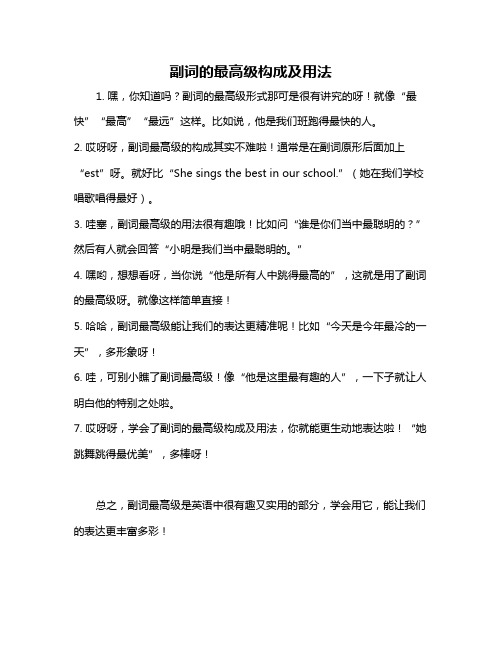
副词的最高级构成及用法
1. 嘿,你知道吗?副词的最高级形式那可是很有讲究的呀!就像“最快”“最高”“最远”这样。
比如说,他是我们班跑得最快的人。
2. 哎呀呀,副词最高级的构成其实不难啦!通常是在副词原形后面加上“est”呀。
就好比“She sings the best in our school.”(她在我们学校唱歌唱得最好)。
3. 哇塞,副词最高级的用法很有趣哦!比如问“谁是你们当中最聪明的?”然后有人就会回答“小明是我们当中最聪明的。
”
4. 嘿哟,想想看呀,当你说“他是所有人中跳得最高的”,这就是用了副词的最高级呀。
就像这样简单直接!
5. 哈哈,副词最高级能让我们的表达更精准呢!比如“今天是今年最冷的一天”,多形象呀!
6. 哇,可别小瞧了副词最高级!像“他是这里最有趣的人”,一下子就让人明白他的特别之处啦。
7. 哎呀呀,学会了副词的最高级构成及用法,你就能更生动地表达啦!“她跳舞跳得最优美”,多棒呀!
总之,副词最高级是英语中很有趣又实用的部分,学会用它,能让我们的表达更丰富多彩!。
副词的比较级构成及用法
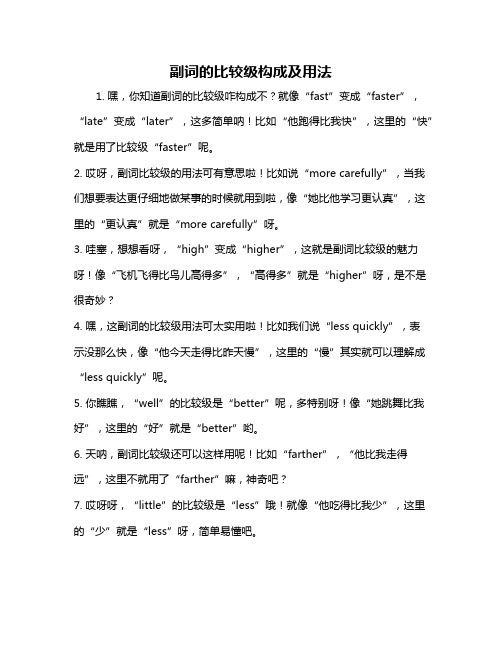
副词的比较级构成及用法
1. 嘿,你知道副词的比较级咋构成不?就像“fast”变成“faster”,“late”变成“later”,这多简单呐!比如“他跑得比我快”,这里的“快”就是用了比较级“faster”呢。
2. 哎呀,副词比较级的用法可有意思啦!比如说“more carefully”,当我们想要表达更仔细地做某事的时候就用到啦,像“她比他学习更认真”,这里的“更认真”就是“more carefully”呀。
3. 哇塞,想想看呀,“high”变成“higher”,这就是副词比较级的魅力呀!像“飞机飞得比鸟儿高得多”,“高得多”就是“higher”呀,是不是很奇妙?
4. 嘿,这副词的比较级用法可太实用啦!比如我们说“less quickly”,表
示没那么快,像“他今天走得比昨天慢”,这里的“慢”其实就可以理解成“less quickly”呢。
5. 你瞧瞧,“well”的比较级是“better”呢,多特别呀!像“她跳舞比我好”,这里的“好”就是“better”哟。
6. 天呐,副词比较级还可以这样用呢!比如“farther”,“他比我走得远”,这里不就用了“farther”嘛,神奇吧?
7. 哎呀呀,“little”的比较级是“less”哦!就像“他吃得比我少”,这里的“少”就是“less”呀,简单易懂吧。
8. 哇哦,副词比较级真的很好玩呀!像“more slowly”,“她比他说话慢一些”,就是用的这个呀。
总之啊,副词的比较级构成和用法其实不难,只要多注意多练习,就可以掌握得很好啦!。
法语语法副词的用法
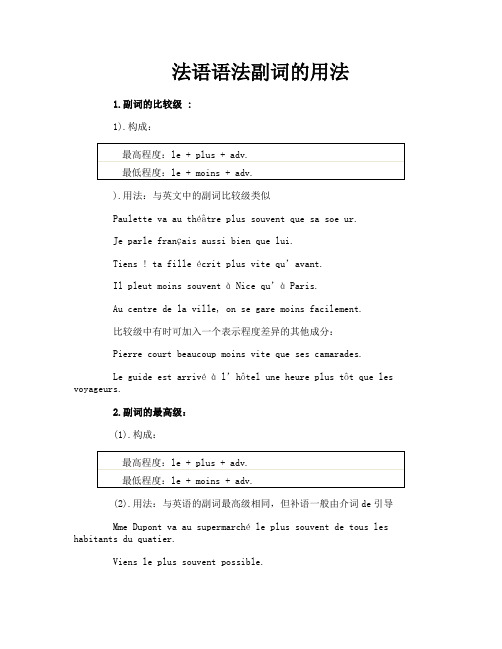
法语语法副词的用法1.副词的比较级 :1).构成:).用法:与英文中的副词比较级类似Paulette va au théâtre plus souvent que sa soe ur.Je parle français aussi bien que lui.Tiens ! ta fille écrit plus vite qu’avant.Il pleut moins souvent à Nice qu’à Paris.Au centre de la ville, on se gare moins facilement.比较级中有时可加入一个表示程度差异的其他成分:Pierre court beaucoup moins vite que ses camarades.Le guide est arrivé à l’hôtel une heure plus tôt que les voyageurs.2.副词的最高级:(1).构成:(2).用法:与英语的副词最高级相同,但补语一般由介词de引导Mme Dupont va au supermarché le plus souvent de tous les habitants du quatier.Viens le plus souvent possible.Viens le plus souvent que tu pourras.注意:几个特殊词形的副词比较级和最高级 :表示数量的.副词beaucoup,其表示同等级的比较级是autant(as much as, as many as) Je crois qu’elle lit autant que moi.Beaucoup de, peu de 也可以有比较级和最高级:Il y a plus de clients au supermarché que chez les petits commerçants.Tu vois, j’ai acheté autant de livres que toi.Elles ont moins de temps pour faire leurs courses.Nicolas fait le plus de fautes dans sa dictée.C’est lui qui a le moins de capacité pour ce travail.3.以-ment构成的副词(1).辅音字母结尾,阴性形式后再加: seul seule seulement(2).-e结尾,直接加ment: simple simplement(3).有的以元音结尾,也直接加ment: vrai vraiment关于ment构成副词的补充 :1).少数以辅音字母结尾的形容词,变成阴性后要将-e改为-é,再加-mentcommun commune communémentprofond profonde profondément2).有些以-e结尾的形容词,将-e改为-é,再加-menténorme énormémentintense intensément3).以-ant, -ent结尾的形容词,分别将词尾换成-amment, -emmentconstant constammentrécent récemment3.副代词y:放在有关动词前,代替以à , dans, sur等介词引导的地点状语,相当于英文中的there。
英语语法讲解:副词比较等级的构成

英语语法讲解:副词比较等级的构成推荐文章英语初中语法学习:如何构成被动语态热度:英语语法里副词比较等级的构成热度:比较真实的入党申请书【30篇】热度:nb的qq网名范文热度:惊蛰吃什么菜比较好热度:副词是描绘动作快慢、频率、方式、程度等内容的一类词。
技巧:把已学过的形容词的比较等级的构成和用法搬过来,只需对个别小差别认清、训练一下,可节省大部分时间和精力。
副词原级:fast(很快地) slowly(慢慢地)副词比较级:faster(较快地) more slowly(更慢地)副词最高级:fastest(最快地) most slowly(最慢地)1.副词比较等级的构成1)单音节副词和个别双音节副词加er, est构成比较级和最高级原级比较级最高级fast(快) faster fastesthard(努力) harder hardestlate(晚) later latestearly(早) earlier earliest2)绝大多数副词加more,most构成比较级和最高级quickly(很快地)→more quickly, most quicklyhappily(快乐地)→more happily, most happilycarefully(细心地)→more carefully,most carefully3)有几个副词的比较等级词形变化不规则原级比较级最高级well(好) better bestbadly(坏) worse worstlittle(少)less leastmuch(多) more mostfar(远) father(较远) farthest(最远)further(进一步) furthest(最久)说明:绝大多数方式副词有比较级和最高级形式,一些程度副词、时间副词、频率副词、地点副词(closer)有比较级和最高级形式,但另有一些副词没有比较等级形式,如only,again, also等。
副词变化规律

副词变化规律
1. 以-ly结尾的规则副词:
这是形成副词最常用的方式,直接在形容词词根后加上-ly后缀即可形成副词。
例如:slow(慢)→slowly(慢慢地)、quick(快)→quickly(快速地)、careful(小心)→carefully(小心地)。
2. 不规则变化的副词:
一些副词的形式与形容词不同,不能按规律形成,需要单独记忆。
例如:well(好地)、fast(快地)、hard(努力地)。
3. 比较级和最高级的变化:
副词的比较级和最高级形式与形容词相似,分别加上-er和-est,或者在前面加more和most。
例如:slow→slower→slowest,quickly→more quickly→most quickly。
4. 复合副词:
一些副词由两个或多个单词组合而成,有时中间会加上连字符。
例如:up-to-date(与时俱进的)、first-hand(亲身的)、inside out(里衬外翻)。
5. 疑问副词:
一些副词用于提出疑问,常见的有why、when、where、how等。
6. 程度副词:
用于表示程度或强调语气的副词,如very、too、quite、rather等。
副词变化规律相对简单明了,但还是需要注意一些例外情况。
熟练掌握这些规律有助于英语写作和口语表达。
语法知识——副词短语详解

语法知识——副词短语详解语法知识——副词短语详解知识点包括副词短语的概念、副词短语的组成等部分,有关语法知识——副词短语详解的详情如下:副词短语的概念副词短语是指由几个副词或副词及其修饰语构成的短语。
副词短语的组成1.两个或多个副词可以由and、but等对等连词构成副词短语。
I tried again and again.我试了一遍又一遍。
(again and again是副词短语)She types quickly and correctly.她打字快且准确。
(quickly and correctly是副词短语)2.very等程度副词作修饰语,可与其他副词构成副词短语。
He runs extremely fast.他跑得快极了。
(extremely fast是副词短语)He can finish that much quicker.他能以更快的速度完成它。
(much quicker是副词短语)The teacher speaks clearly enough.老师说得够清楚的。
(clearly enough是副词短语,enough在副词后作修饰语)3.介词及其宾语可用在副词后修饰副词,可与副词构成副词短语。
He ran fast on his way home.回家的路上他跑得很快。
(fast on his way home是副词短语)He speaks English slowly to his students.他以缓慢的速度对他的学生们说英语。
(slowly to his students是副词短语)4.不定式或不定式短语在副词后作修饰语,可与副词构成副词短语。
She tried hard to move the box.她费力要移动那个箱子。
(hard to move the box是副词短语)。
- 1、下载文档前请自行甄别文档内容的完整性,平台不提供额外的编辑、内容补充、找答案等附加服务。
- 2、"仅部分预览"的文档,不可在线预览部分如存在完整性等问题,可反馈申请退款(可完整预览的文档不适用该条件!)。
- 3、如文档侵犯您的权益,请联系客服反馈,我们会尽快为您处理(人工客服工作时间:9:00-18:30)。
副词构成法
1.有些副词为简单副词(不带词尾):
often,out,quite,soon,home,back,there,thus,seldom,ever
2.有些副词,特别是地点副词及时间副词,常常以加词尾的方式构成:
-ly(=every):yearly,monthly,daily,fortnightly
-ward(s)(=toward):backward(s),leftward(s),upward(s),homeward(s),eastward (s),onward(s),inward(s)
-wise,-ways:lengthwise,clockwise,likewise,otherwise;always,lengthways,sideways-long:headlong-ling(s):sideling(s)
-s:upstairs,outdoors,sometimes,nowadays,needs或在一些单音节词前加词头或其他简单字:
a-:along,away,abroad,apart,aside,adraft,aloud,ashore,across,above
be-:before,below,beneath,besides
介词:inside,overboard,uphill,beforehand,today
there-:therein(=in that),thereafter,thereby,thereof,therewith,ect.(陈旧用法)
here-:herein(=in this),hereafter,hereby,hereof,herewith,etc.(陈旧用法)
where-:wherein(=in what or which),whereon,whereby,whereof,wherewith,ect.(陈旧用法)
3.绝大多数副词都由形容词以下述3种方式构成:
a.大多数方式副词,都在形容词后加-ly构成。
注意拼法:
形容词副词形容词副词
glad gladly mournful mournfully
happy happily heavy heavily
jolly jollily silly sillily
shy shyly dry dryly
due duly true truly
able ably probable probably
dull dully full fully
vile vilely sole solely
despotic despotically idiomatic idiomatically
public publicly(例外情况)
ill-natured ill-naturedly kind-hearted kind-heartedly
provoking provokingly charming charmingly
faltering falteringly lingering lingeringly (书面语)
mistaken mistakenly hidden hiddenly
marked markedly undisguised undisguisedly (书面语)
但是:friendly(形容词)—in a friendly way;manly(形容词)—in a manly manner;kingly (形容词)—in akingly manner.
和形容词一样,以-ingly或-edly结尾的副词,也有激起感情及感受情绪的差别,但用得比较少,如:
激起情绪感受情绪
He speaks amusingly We listen amusedly.
The flowers bloom delightfully.We watch them de-ligtedly
He behaves disgustingly.We left disgustedly.
The fight goes on excitingly.We look on excitedly.
b.有少数副词和形容词形式相同:
He came in the late afternoon.(形容词)
He arrived late.(副词)
He has waited for a long time.(形容词)
He has waited so long.(副词)
另一些与形容词同形的副词有:
early,fast,far,near,well,ill,high,low,much,lit-tle,only,enough,hard,straight,right,wrong,left,east,west
在口语中有些形容词直接用作副词:
It is mighty good.
I am dead tired.
The soup is precious hot.
He is terrible rude.
c.有些单音节形容词有两个副词形式,一个带-ly,一个不带,意思不相同:
We must buy cheap(=at a low price).We got offcheaply(=easily).
He lives high(=luxuriously).He spoke highly(=well)of me.
He came near.He nearly(=almost)died.
He played foul.He was foully murdered.
I love Mary most.They are mostly crazy.
4.有少数副词与指示代词同形:
He has some(=about)fifty pounds.
It something(=somewhat)astonished me.
I care nothing(=not at all)for your threat.
Can you wait any(=in any way)more?I can't wait anymore.
I slept none(=never).I passed the night none too com-fortably.Is it that(=so)easy?
He is all(=entirely)alone.。
